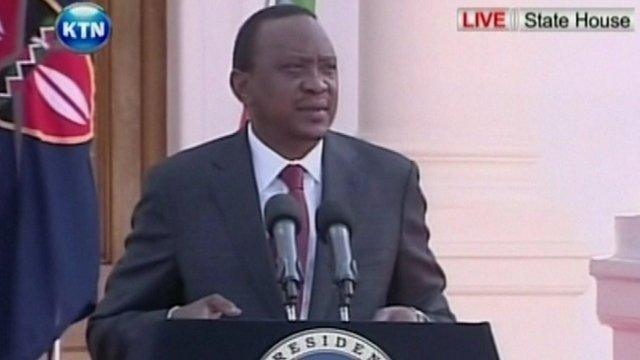Kenya attacks: Al-Shabab not involved - Kenyatta
- Published
Anne Soy reports from Lamu: ''The residents of this area feel unsafe''
Somali Islamist group al-Shabab was not behind deadly attacks on Kenya's coast, the president has said, contradicting the militant group's claims.
More than 60 people were killed in two days near the town of Mpeketoni.
President Uhuru Kenyatta has blamed "local political networks" for the violence, saying members of one ethnic group were targeted.
Most of the dead were ethnic Kikuyus, like the president. Non-Muslims were singled out to be killed.
The BBC had been told that 12 women whose husbands were not at home during the second attack in the Poromoko district near Mpeketoni were abducted but this later proved not to be the case.
The Red Cross says that eight people are still unaccounted for after the first attack on Sunday night. It had said 50 people were missing.
Al-Shabab has said it was behind both attacks, in revenge for the presence of Kenyan troops in Somalia and the killing of Muslims.
Kenya sent troops to Somalia in 2011 to help the weak UN-backed government defeat the militants.

Analysis: Dennis Okari, BBC News, Nairobi
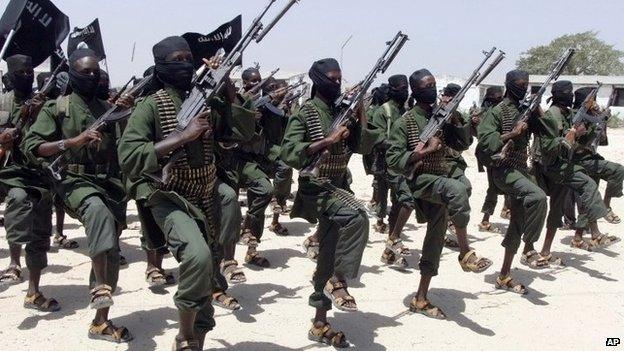
Al-Shabab fighters have carried out a number of deadly attacks in Kenya in recent months
Two days after the deadly wave of violence in Mpeketoni, Kenyans are still unclear who is responsible.
If it was al-Shabab, the targeting of villages, not towns, and the killing of men only, would be new tactics. By sparing women and children, they could be trying to sanitise their image after even their own supporters criticised them for the indiscriminate killings during the Westgate siege last year.
But there are long-standing political and ethnic divisions in Mpeketoni, and the president has blamed "local political networks" for the deaths. Local ethnic Somalis or Oromos may have targeted members of the president's Kikuyu community and tried to divert the blame by waving al-Shabab flags.
Some locals see the Kikuyus as interlopers, who have become rich after the government gave them land. These are the same feelings which lay behind the deadly ethnic violence which swept the nation after the disputed 2007 elections.

'Politically motivated'
The attacks were "well planned, orchestrated and politically motivated ethnic violence against against a Kenyan community, with the intention of profiling and evicting them for political reasons," President Kenyatta said in a national address on Tuesday.
"This therefore was not an al-Shabab attack," he continued. "Evidence indicates that local political networks were involved in the planning and execution of a heinous crime".
President Uhuru Kenyatta blamed "local political networks" for the overnight raid
He did not give further details of the suspected attackers. However, he said the police in Mpeketoni were given advance intelligence about the attack, but did not act on it.
"Accordingly, all concerned officers have been suspended and will be charged immediately in a court of law," he added.
But opposition Senator Moses Wetangula has dismissed the president's allegations, describing them as "a joke".
"We Kenyans in the leadership instead of calling in our friends who have better technology, better intelligence, better capacity to even use drones to hit these guys. We are saying it is not terrorism, it is political," he told the BBC.
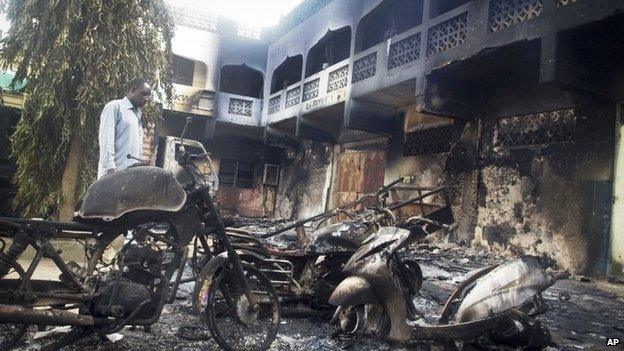
Hotels, restaurants and the police station were attacked in Sunday's attack on Mpeketoni
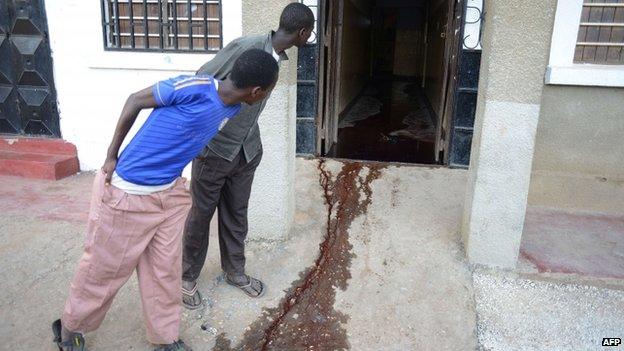
Many people were reportedly shot in a restaurant where they tried to hide from the attackers
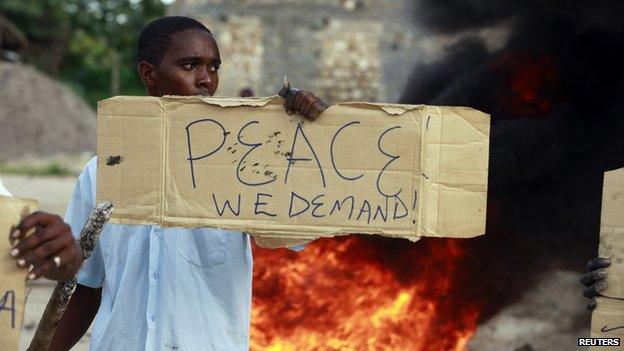
Local residents of Mpeketoni staged protests over the recent attacks on Tuesday
Forty-nine bodies have been found after the first attack and 15 after the second, officials say.
"There's no time to mourn, we're just burying [the victims]," a resident told the BBC's Anne Soy in the town.
Al-Shabab spokesman Sheikh Abdiasis Abu Musab told Reuters news agency on Tuesday that: "We raided villages around Mpeketoni again last night".
He was later quoted by the AFP news agency as saying that the militants "have been going to several places looking for military personnel". He said most of those killed were police officers and wildlife wardens.
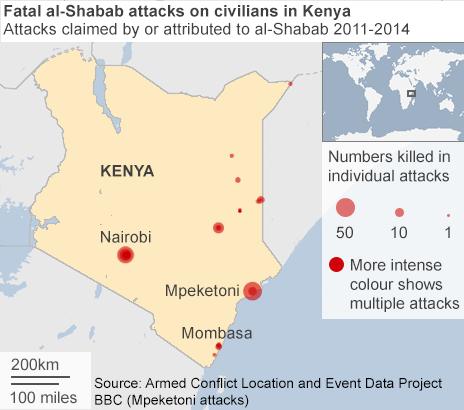
Kenya has been on high alert recently following warnings that al-Shabab was planning more attacks.
The authorities are under mounting pressure from the public, amid criticism they have failed to prevent the latest string of attacks on the coast.
The US and UK have issued advisories to their nationals to keep away from parts of the Kenyan coast and hundreds of British tourists were evacuated last month.
Last week, the UK closed its consulate in the port city of Mombasa.
Correction 18 June 2014: An earlier version of this story was based on the reported abduction of 12 women, which subsequently proved not to be true.
- Published17 June 2014
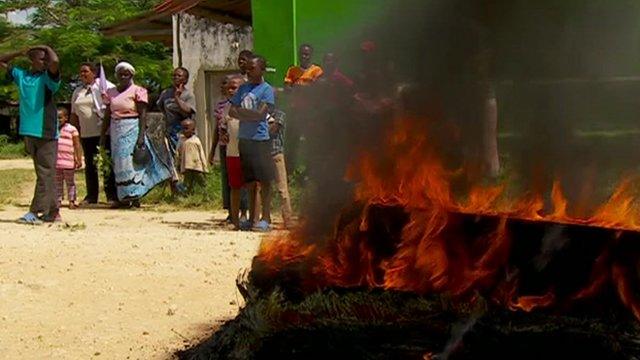
- Published16 June 2014
- Published22 December 2017
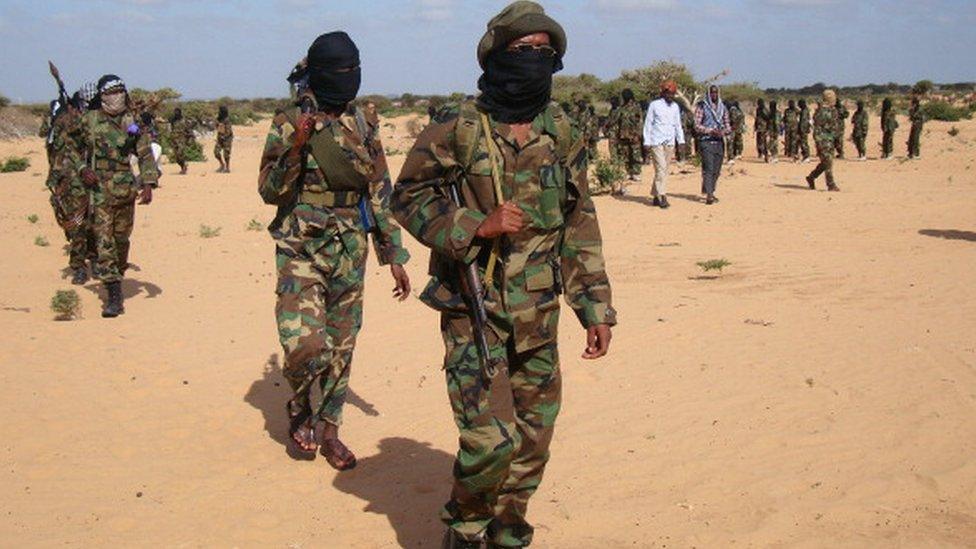
- Published16 May 2014
